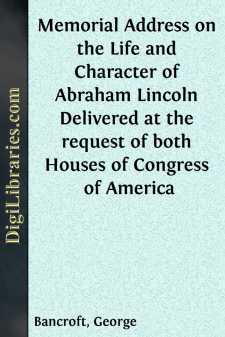Categories
- Antiques & Collectibles 13
- Architecture 36
- Art 48
- Bibles 22
- Biography & Autobiography 813
- Body, Mind & Spirit 142
- Business & Economics 28
- Children's Books 16
- Children's Fiction 13
- Computers 4
- Cooking 94
- Crafts & Hobbies 4
- Drama 346
- Education 46
- Family & Relationships 57
- Fiction 11829
- Games 19
- Gardening 17
- Health & Fitness 34
- History 1377
- House & Home 1
- Humor 147
- Juvenile Fiction 1873
- Juvenile Nonfiction 202
- Language Arts & Disciplines 88
- Law 16
- Literary Collections 686
- Literary Criticism 179
- Mathematics 13
- Medical 41
- Music 40
- Nature 179
- Non-Classifiable 1768
- Performing Arts 7
- Periodicals 1453
- Philosophy 64
- Photography 2
- Poetry 896
- Political Science 203
- Psychology 42
- Reference 154
- Religion 513
- Science 126
- Self-Help 84
- Social Science 81
- Sports & Recreation 34
- Study Aids 3
- Technology & Engineering 59
- Transportation 23
- Travel 463
- True Crime 29
Memorial Address on the Life and Character of Abraham Lincoln Delivered at the request of both Houses of Congress of America
by: George Bancroft
Categories:
Description:
Excerpt
ORATION.
SENATORS,
REPRESENTATIVES OF AMERICA:
That God rules in the affairs of men is as certain as any truth of physical science. On the great moving power which is from the beginning hangs the world of the senses and the world of thought and action. Eternal wisdom marshals the great procession of the nations, working in patient continuity through the ages, never halting and never abrupt, encompassing all events in its oversight, and ever effecting its will, though mortals may slumber in apathy or oppose with madness. Kings are lifted up or thrown down, nations come and go, republics flourish and wither, dynasties pass away like a tale that is told; but nothing is by chance, though men, in their ignorance of causes, may think so. The deeds of time are governed, as well as judged, by the decrees of eternity. The caprice of fleeting existences bends to the immovable omnipotence, which plants its foot on all the centuries and has neither change of purpose nor repose. Sometimes, like a messenger through the thick darkness of night, it steps along mysterious ways; but when the hour strikes for a people, or for mankind, to pass into a new form of being, unseen hands draw the bolts from the gates of futurity; an all-subduing influence prepares the minds of men for the coming revolution; those who plan resistance find themselves in conflict with the will of Providence rather than with human devices; and all hearts and all understandings, most of all the opinions and influences of the unwilling, are wonderfully attracted and compelled to bear forward the change, which becomes more an obedience to the law of universal nature than submission to the arbitrament of man.
In the fulness of time a republic rose up in the wilderness of America. Thousands of years had passed away before this child of the ages could be born. From whatever there was of good in the systems of former centuries she drew her nourishment; the wrecks of the past were her warnings. With the deepest sentiment of faith fixed in her inmost nature, she disenthralled religion from bondage to temporal power, that her worship might be worship only in spirit and in truth. The wisdom which had passed from India through Greece, with what Greece had added of her own; the jurisprudence of Rome; the mediaeval municipalities; the Teutonic method of representation; the political experience of England; the benignant wisdom of the expositors of the law of nature and of nations in France and Holland, all shed on her their selectest influence. She washed the gold of political wisdom from the sands wherever it was found; she cleft it from the rocks; she gleaned it among ruins. Out of all the discoveries of statesmen and sages, out of all the experience of past human life, she compiled a perennial political philosophy, the primordial principles of national ethics. The wise men of Europe sought the best government in a mixture of monarchy, aristocracy, and democracy; America went behind these names to extract from them the vital elements of social forms, and blend them harmoniously in the free commonwealth, which comes nearest to the illustration of the natural equality of all men....


